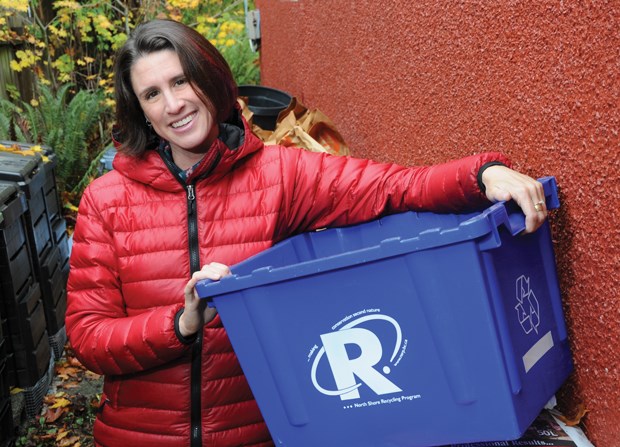The tri-municipal agency that pioneered curbside recycling on the North Shore and delivered a variety of innovative sustainability-focused outreach programs – from backyard vegetable gardens to compost coaching – is being phased out.
North Shore Recycling Program, which began in 1990, will close at the end of 2015, leaving individual municipalities to work directly with residents on questions or issues related to recycling, composting or waste reduction.
“The North Shore Recycling Program was conceived 25 years ago when residential recycling was a brand new concept,” NSRP’s acting manager Kathleen O’Malley said in a statement. “This upcoming transition to individual municipal responsibility really reflects the changing landscape in waste reduction and recycling.”
Steve Ono, District of North Vancouver’s manager of engineering services, said several stewardship programs and regulations have been introduced in recent years that have helped to transform waste reduction and make recycling mainstream, causing the municipality to revisit how it manages recycling.
“We’ve got to fine-tune our efforts to suit each individual municipality,” he said.
Ono noted that all three North Shore municipalities will continue to work together, sharing a tri-municipal recycling collection contract and operation of the drop-off depot on Riverside Drive.
And while North Shore residents shouldn’t expect to see any change in curbside recycling collection, outreach and educational programs may differ.
“They may see different emphasis put on the different areas of outreach depending on what each municipality decides is their priority,” said Ono.
Ono, a long-time North Vancouver resident and municipal employee, is well aware of the positive legacy NSRP leaves behind.
“Really successful, the Blue Box program – things like that stand out. Just knowing where to go any time you had a question about where you could take something or put something to get it properly recycled you always had that one-stop shop – you go to the North Shore Recycling depot or go to their website to get the answers,” he said. “The program has been very successful over the years and it’s got a lot of name recognition.”
O’Malley said most of NSRP’s employees will be repositioned to one of three partner municipalities.
The annual administrative and outreach cost for NSRP was $740,000, which included salaries, programs and administration of the recycling collection contract.
Overall, the cost of the recycling contract, operating the drop-off depot, administrative and outreach cost $5.8 million annually and was shared between the three municipalities.
Elizabeth Leboe, who worked at NSRP from 2006 to 2013 and volunteered for the Natural Garden Tours from 1999-2006, described the agency as a community-building catalyst on the North Shore.
She noted that NSRP delivered a variety of programs and green initiatives on the North Shore over the years, from GardenSmart workshops and garden tours to rolling out the Green Bin organics collection and supporting the North Shore Black Bear Society to reduce human-bear conflicts.
“All the municipal services are going to continue, they are still going to be collecting the stuff people put at the curb that they don’t want anymore, dealing with that responsibly. I think what will be missed is this one-stop shop ... a place you could go or phone and talk to people who kind of know everything about everything.”
Those questions, Leboe explained, could range from recycling and garbage collection to “what do I do with this weird stuff I found in my grandfather’s basement when we were cleaning out his house that looks like an unexploded bomb?”
Christine Miller, education co-ordinator for the North Shore Black Bear Society, said the two groups worked closely together over the years.
“They helped people develop practices to build a more sustainable future and always provided guidance on how to prevent wildlife conflict with their outreach on garbage collection, the Green Can program and backyard composting,” she wrote in a note.
“We will miss the visibility of the NSRP, and we will miss the opportunities to work so closely with their amazing staff.”



